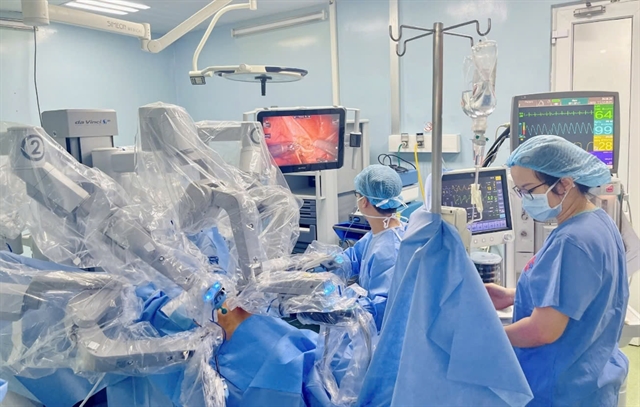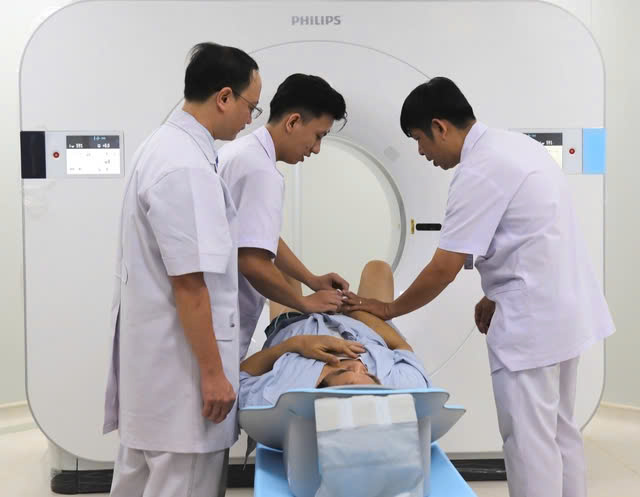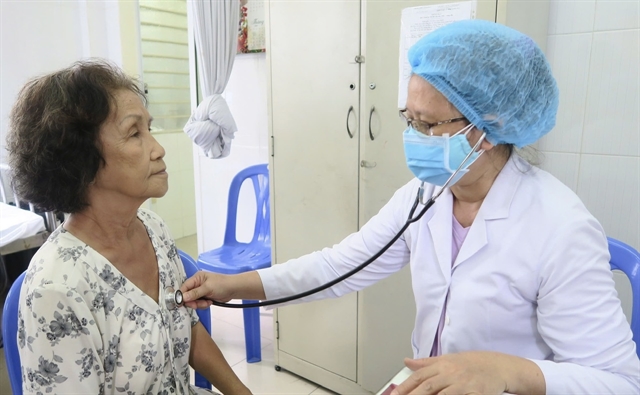 Society
Society

 |
| Doctors at Bình Dân Hospital perform a robotic surgery. — Photo courtesy of the hospital |
HCM City – HCM City has firmly established itself as a premier healthcare centre in the 50 years since national reunification, having built a robust and modern healthcare system and made significant strides in medical research, according to city authorities.
Tăng Chí Thượng, director of the city’s Department of Health, said many of the city’s hospitals have mastered specialist techniques that are on par with the best in the world, providing high-quality, specialised medical services for both locals and foreign patients.
The city has placed a high priority on developing community healthcare and building equitable, quality and globally integrated healthcare services, laying a solid foundation for its ambition to establish itself as a healthcare hub in the ASEAN region by 2030, Thượng said.
As of the end of last year, it had a ratio of 21 doctors per 10,000 people and 43 hospital beds per 10,000 people.
City Party Secretary Nguyễn Văn Nên said the health sector had kept pace with global development and integration trends throughout its 50-year journey of development.
“From a fragile medical system that faced a number of shortcomings 50 years ago, today we have constructed a comprehensive and modern healthcare network, affirming its position as a major healthcare centre within the country,” he said at a meeting held to mark the 70th anniversary of Vietnamese Doctors’ Day on February 25.
He highlighted the consistent growth of the medical workforce, its notable achievements in research, and its mastery of specialised techniques.
The level of science and technology in the medical field is approaching that of some of the most advanced countries, with advancements in medical technology being adopted in areas such as organ transplantation, endoscopic surgery, interventional cardiology, nuclear medicine, and assisted reproduction, he said.
The adoption of AI, telemedicine, and digital health solutions is also increasing, he said.
 |
| Thống Nhất Hospital’s high-tech imaging diagnostic centre is equipped with modern medical devices. — VNS Photo Thu Hằng |
Advancements in medical technology
In the field of obstetrics and gynaecology, the city has a low maternal mortality rate, and hospitals have mastered modern prenatal screening techniques.
The success rate of in vitro fertilisation is high, at 50–60 per cent, which is comparable to developed countries, but with lower treatment costs, according to a report released by the department.
In paediatrics, hospitals have successfully performed many complex organ transplants, separated conjoined twins and saved the lives of numerous premature babies.
Complex diseases such as spinal muscular atrophy and cardiovascular diseases are also effectively treated with the application of advanced techniques, including CT, cardiac MRI, and congenital heart surgery.
In the field of surgery, the city has adopted minimally invasive techniques such as laparoscopic surgery, robotics, and endovascular intervention. Titanium 3D printing technology has been used in orthopaedic treatment, demonstrating high efficiency.
The field of neurosurgery is also thriving, with advanced techniques for the treatment of brain tumours and cerebrovascular disease.
Plastic surgery, microsurgery and robotic surgery are done using advanced techniques that are on par with international standards.
People’s Hospital 115 receives more than 15,000 stroke patients each year and plays a role as a leading training centre in the country.
Complex organ transplant techniques, such as ABO-incompatible kidney transplant, liver transplant, and heart transplant, have been successfully performed at many major hospitals in the city.
Other specialties, such as otolaryngology, ophthalmology, maxillofacial surgery, dermatology, haematology, and molecular biology, are also increasingly adopting advanced technologies.
Development of community healthcare
In the last 50 years, the healthcare sector has focused on improving disease prevention capacity, strengthening grassroots healthcare and developing community health.
The life expectancy of city residents has increased from 66 years in 1979 to 76.6 years in 2024, which is higher than the national average of 74.7 years.
The average height has improved significantly, increasing from 168.2 cm in 2014 to 169.2 cm in 2019 for men and from 155.9 cm to 157.0 cm for women.
With a focus on the development of primary and community healthcare, the city has steadily reduced the rate of malnutrition and blindness, while improving the quality of healthcare, well-being and life expectancy.
It has eliminated polio, neonatal tetanus, malaria, and leprosy, and has effectively controlled HIV/AIDS, with a target to end the scourge by 2030.
 |
| A senior citizen in HCM City gets free health checks at the Ward 9 health station, District 8. — VNS Photo Thu Hằng |
Digital transformation
HCM City is increasingly investing in building smart healthcare and integrating AI technologies to facilitate more efficient healthcare services and better patient outcomes, and is focusing on patient-centric care, Thượng said.
Through digital transformation, hospitals and medical facilities can optimise workflows, reduce patients’ waiting times, manage patient data systematically and securely and improve hospital administration, he said.
For the last three years, Nguyễn Thị Nga, 56, has had check-ups and treatment for bone and joint diseases and hypertension at the Thủ Đức City Hospital.
Until a year ago, she had to go there early in the morning and wait for hours to see her doctor.
But now it has become extremely convenient after the hospital started using QR codes to streamline appointments, allowing patients to make them easily by scanning a QR code with their smartphone.
“Every time I visit the hospital, I just scan the QR code printed on the prescription and make an appointment, making it convenient and timesaving,” she said.
In the past, when taking their children to the City Children’s Hospital in Bình Chánh District, people had to carry a lot of documents, including medical records and test results.
Now the situation is completely different since the hospital maintains electronic health records that contain a comprehensive collection of a patient’s medical history, medications, laboratory test results, and other health information.
Bích Liễu of Bình Chánh District takes her child to the City Children’s Hospital every time she is sick.
“I was instructed to download an application and fill in the information to make an appointment so that I do not have to wait so long to see a doctor,” she said.
“I can also see my daughter’s medical history, test results, and even her vaccination schedule. It is really convenient.”
Dương Minh Trí, head of the examination department at the City Children’s Hospital, said with the digitilisation of health records, doctors easily assess, monitor and evaluate the treatment process for children.
Besides, sharing of information between specialities has also become faster and more accurate, he said.
Thượng said the health sector is actively exploring digital solutions and artificial intelligence to provide better care for both locals and international patients.
Some hospitals have shifted from paper to electronic medical records, including City Children’s Hospital, Children’s Hospital 1, Traditional Medicine Hospital, Hùng Vương Hospital, and the University of Medical Centre HCM City.
The use of telemedicine helps connect doctors at lower levels with specialists at advanced hospitals, enabling remote medical examination and treatment, and providing remote support for doctors working at grassroots healthcare facilities in the southern region.
Many medical facilities have embraced AI for diagnosis and treatment.
The Thạnh An island commune health station in Cần Giờ District, for example, has been using an AI-powered system for analysing chest X-rays for the last two years.
Bình Dân Hospital is a regional training centre for robotic surgery, which it has been performing for years.
“The intensive investment in modern infrastructure, digital health and medical innovation, workforce development and international cooperation will elevate the healthcare sector to new heights,” Thượng concluded. — VNS
 |
| The University of Medical Centre HCM City is a pioneer in digitising health records. — Photo courtesy of the hospital |